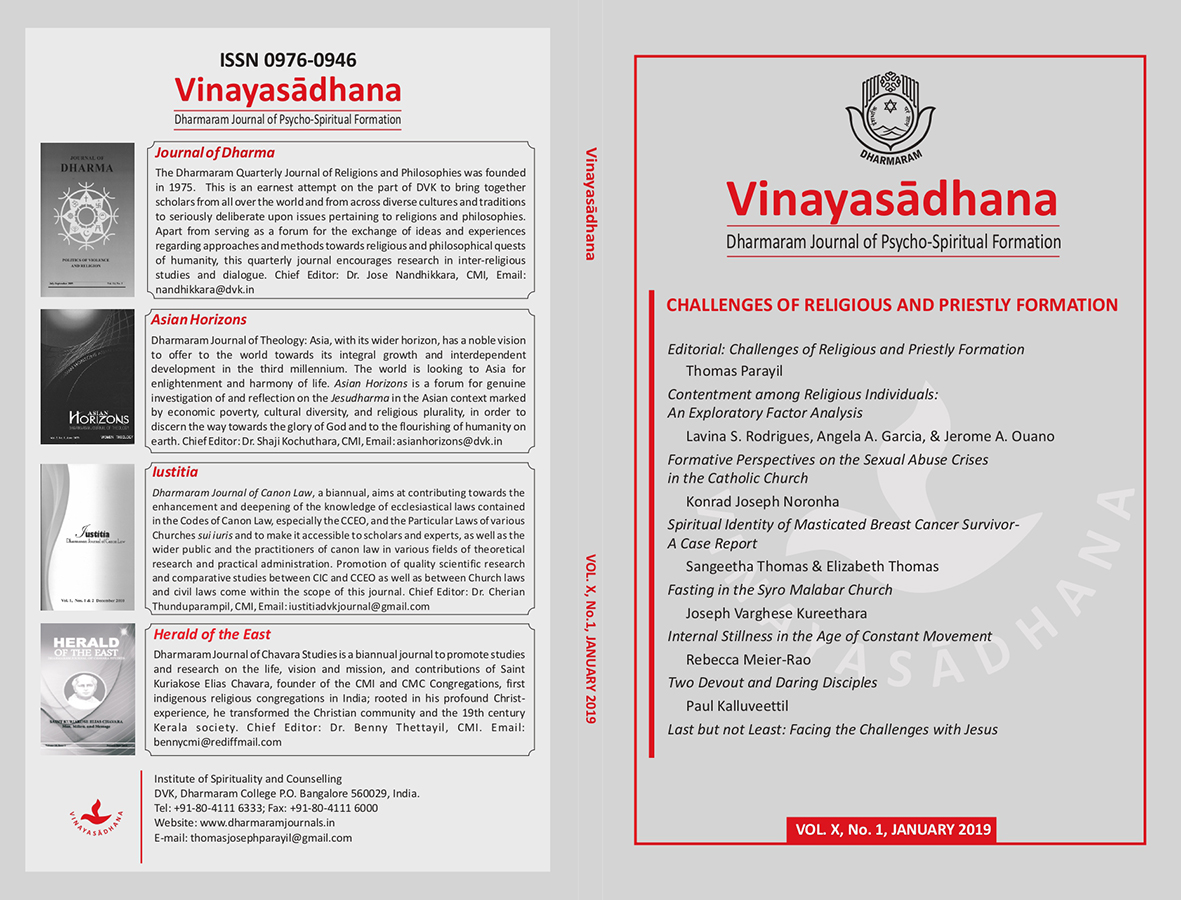Spiritual Identity of Masticated Breast Cancer Survivor
A Case Report
Keywords:
Case Report, Breast cancer, Mastectomy, Spiritual IdentityAbstract
The identity of an individual is made up of goals, values, and beliefs to which a person is committed. It is considered as a coherent conception of the self, a distinguishing character or an individual’s personality. Spirituality/religiosity is one that describes an individual’s identity. It is an existential desire of an individual to orient life into ultimate questions of value or meaning. The present study explores the spiritual identity of a masticated breast cancer survivor using a case study approach. The in-depth interview was conducted among 35-year-old Indian Christian women who have undergone unilateral mastectomy and is a survivor. She has used spirituality as a medium in the recovery process. The case describes the fluctuations of spiritual identity over the period of recovery. The spiritual identity is seen as trusting in higher power and prayer as a medium for solace. However, after the treatment process, the participant reported herself to have enhanced faith and transcendence. In summary, spiritual and religious believes stayed as one of the significant ways of dealing with the cancer experience of the participant.
References
Arman, M., & Rehnsfeldt, A. (2003). The Hidden suffering among breast cancer patients: A qualitative metasynthesis. Qualitative Health Research, 13(4), 50-527.
Carpenter, J. S., Brockopp, D. Y., & Andrykowski, M. A. (1999). Self transformation as a factor in the self-esteem and well-being of breast cancer survivors. Journal of Advanced Nursing, 29(6), 1402-1411.
Fardella, J. (2005). Spiritual Identity and Transformation: Christian Narratives, Public Discourse, and Critical Social Work Practice. Critical Social Work, 6(2).
Feher, S., & Maly, R. C. (1999). Coping with breast cancer in later life: The role of religious faith. Psychooncology, 8(5), 408-416.
Hauge, A. L. (2007). Identity and place: a critical comparison of three identity theories. Architectural science review, 50(1), 44-51.
Lauver, D. R., Connolly-Nelson, K., & Vang, P. (2007). Stressors and coping strategies among female cancer survivors after treatments. Cancer Nursing, 30(2), 101-111.
Lynn Gall, T., & Cornblat, M. W. (2002). Breast cancer survivors give voice: a qualitative analysis of spiritual factors in long‐term adjustment. Psycho-oncology, 11(6), 524-535.
Santrock, J. W. (2009). Life-span development. Boston: MA: McGraw-Hill.
Subnis, U. B. (2011). Triumph Over Adversity: A Qualitative Study of Narrative, Coping and Experience in Individuals Diagnosed with Cancer. The Pennsylvania State University, Communication Arts and Sciences. The Pennsylvania State University. Retrieved from https://etda.libraries.psu.edu/catalog/11453
Taleghani, F., Yekta, Z. P., & Nasrabadi, A. N. (2006). Coping with breast cancer in newly diagnosed Iranian women. Journal of Advanced Nursing, 54(3), 265–272. doi:10.1111/j.1365-2648.2006.03808_1.x


